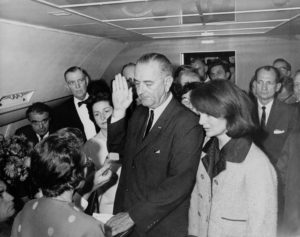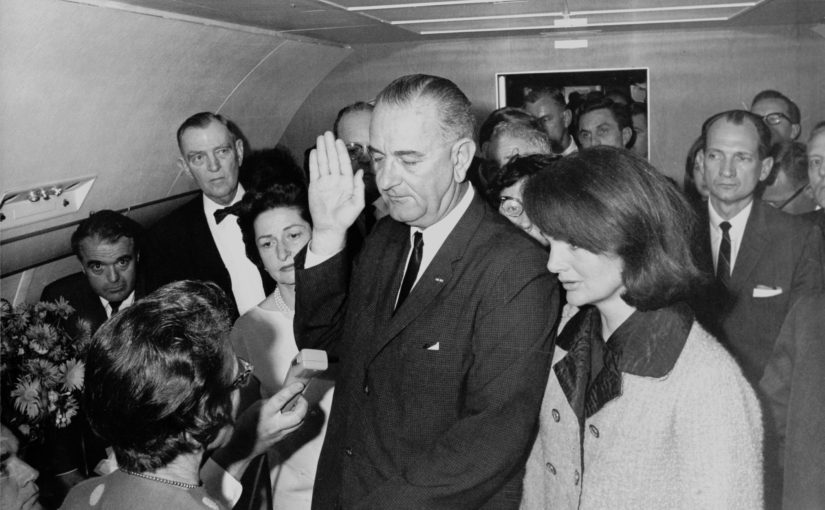
Natalie Portman plays Jackie at her most vulnerable moment, including portraying the first lady in her infamous blood-splattered dress
Natalie Portman proves herself an Oscar contender in the recent biographic drama “Jackie.”
“Jackie” follows the story of former first lady Jacqueline Kennedy in the days immediately after her husband’s assassination and her insistence on cementing his legacy in the American memory.
In less than two hours, director Pablo Larraín guides audiences from the moments leading up to President John F. Kennedy’s assassination, through the first lady’s frantic attempts to accept her husband’s fate and her lavish planning of the president’s funeral — modeled closely after the events of Abraham Lincoln’s.
The audience experiences “Jackie” much in the way one might experience grief. It moves slowly and solemnly, characterized more by its moments of inaction than of action.
Its immaculate showings in both costuming, set design and cinematography draws the audience back into 1960s America. Costume designer Madeline Fontaine never forgets Jackie’s role as a fashion icon and recreates some of her most well known outfits, most importantly the pink and navy Chanel suit splattered in JFK’s blood Jackie refuses to remove for President Lyndon B. Johnson’s swearing-in.
But all other aspects of the production feel intended to focus the audience attention exclusively on the performance by Natalie Portman.
Portman (“Black Swan,” “V for Vendetta”) portrays trauma like audiences already know she can. In spite of her baring almost no resemblance to the former first lady herself, her performance is believable and raw.
The film relies heavily on this ability, providing her with mesmerizing close-up after close-up and moment after moment in which we care about nothing more than the subtle changes in the first lady’s expression.
Beyond Portman, casting fell mostly flat. But then again, no one else really matters.
Despite my awe of “Jackie,” I found myself struggling to engage with some of the film’s quieter moments. As a 22-year-old, I was clearly not the film’s intended audience.
I don’t remember where I was the day JFK was shot. I didn’t crowd around a TV set to watch the first family march the length of Pennsylvania Ave. behind my deceased president.
I never envied Jackie O’s closet or lusted after her husband. I never wept for my country or speculated over communist involvement.
Looking around the crowded theatre, I was one of maybe six attendees under the age 50.
The film relies on nostalgia for a time when our leaders were symbols of hope, optimism and beauty that perhaps an older generation of viewers longs to return to.
I sometimes question how it’s possible such a reality ever existed.
But what “Jackie” left me with was not a needed remembrance of what government could be, but instead it made me consider how we remember our presidents and whether that legacy is deserved or simply a fabrication.
Furthermore, our remembrance of history is dependent less on objective reality than on who has the power to influence and record it.
Without warning, “Jackie” situates itself firmly in our “post-truth” era despite its setting over five decades ago.
There’s a powerful moment near the beginning of the film in which Jackie asks an ambulance driver:
“Do you know who James Garfield was? … Do you know who William McKinley was? Or what he did?”
To both questions, the driver responds no.
“They were both U.S. Presidents killed while they were in office. And what about Abraham Lincoln? Do you know what he did?”
“He won the Civil War. He abolished slavery, ma’am.”
Portman turns to Bobby Kennedy (Peter Sarsgaard) to say she wants the books on Lincoln’s funeral.
The film encourages us to remember Jackie O not for her poise or her style but for her obsession with ensuring JFK was remembered as a hero.
Most of the film is served to its viewers as a series of flashbacks, framed by Jacquline Kennedy’s conversation with Life magazine reporter Theodore H. White (Billy Crudup) just a week after the assassination.
It is in this interview that the first lady plants the Camelot metaphor:
“King Arthur and the Knights of the Round Table — that’s what ‘Camelot’ is about —ordinary men banding together to fight for a better world. Don’t misunderstand me; Jack wasn’t naive. But he had ideals. Ideals he could rally others to believe in.”
The problem with Jacqueline Kennedy’s “Camelot” metaphor is that despite King Arthur’s idealistic appeal, the plot of Lerner and Loewe’s musical focuses on the forces working against him and on the king’s inability to handle them well.
But unlike in the weeks following the death of the nation’s leader, perhaps this time around audiences might see the irony.
The Fargo Theatre is showing “Jackie” at 4:45 p.m. and 7 p.m. through Thursday. Tickets are $7 before 6 p.m. and $8 with student ID after.
